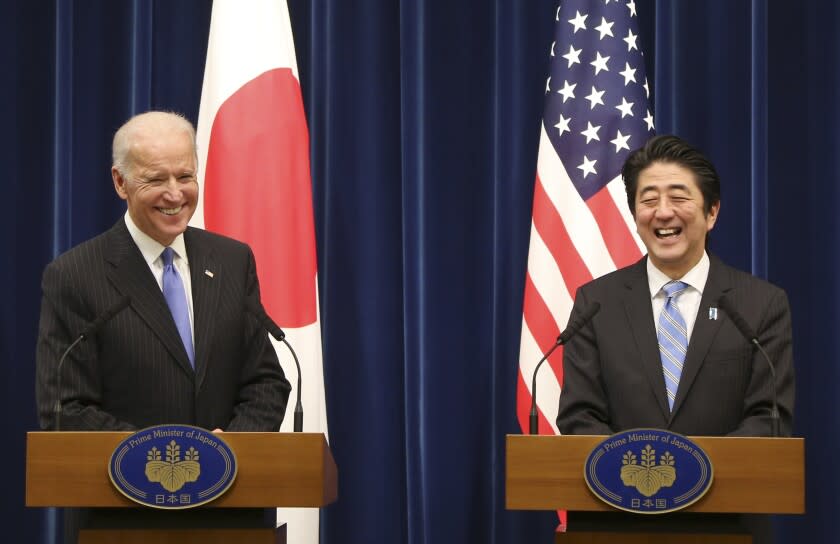Biden and former U.S. presidents shocked by Shinzo Abe's assassination
- Oops!Something went wrong.Please try again later.
- Oops!Something went wrong.Please try again later.
- Oops!Something went wrong.Please try again later.
- Oops!Something went wrong.Please try again later.

President Biden and other U.S. leaders mourned the death of Japan's former Prime Minister Shinzo Abe, who was assassinated Friday while delivering a campaign speech ahead of his country's parliamentary elections.
"I am stunned, outraged, and deeply saddened by the news that my friend Abe Shinzo, former Prime Minister of Japan, was shot and killed while campaigning," Biden said in a statement. "This is a tragedy for Japan and for all who knew him."
Speaking to reporters at the White House, Biden said Friday that he did not believe the assassination would "have any profound destabilizing impact on Japanese security and Japanese solidarity." The island nation remains a "very stable ally," Biden said, adding he would visit the country's embassy in Washington to sign a condolence book.
As vice president, Biden worked closely with Abe on efforts to reduce nuclear stockpiles and to deescalate tensions with China. Abe resigned as prime minister in 2020 for health reasons.
Abe, 67, was fatally shot Friday in broad daylight in Nara, a western city about 300 miles from Tokyo. Japan is known for having strict gun laws, and early reports indicate the assassin used a home-made weapon.
Abe was the longest-serving prime minister in Japanese history and during his tenure worked closely with former Presidents George W. Bush, Obama and Trump.
As prime minister, Abe re-asserted Japan's influence in global politics and helped usher in modest economic gains. He sought to reassert Japan's influence on the international stage by bringing the Summer Olympics to Tokyo in 2021, and by building up Japan's military, despite its pacifist constitution. And he drew controversy by leading efforts in Japan to gloss over wartime atrocities committed by Japan.
On the 75th anniversary of Japan's attack on Pearl Harbor in 2016, Obama and Abe scattered petals on the waters and warned about the threat posed by isolationists and those seeking to back away from international cooperation.
The ceremony took place after Trump had won the presidential election but before he took office. Abe wasted little time in seeking to build a bond with Trump, who had campaigned on an "America First" agenda, and was the first foreign leader to visit the then-president's resort in Florida.
On his Truth Social social media platform, Trump said the assassination was "Really BAD NEWS FOR THE WORLD!"
Abe "was a unifier like no other, but above all, he was a man who loved and cherished his magnificent country, Japan," Trump said. "Shinzo Abe will be greatly missed. There will never be another like him."
Former President Obama said on Twitter that he was "shocked and saddened" by Abe's death and described the former prime minister as a "longtime partner" who "was devoted to both the country he served and the extraordinary alliance between the United States and Japan."
Times news researcher Scott Wilson contributed to this report.
This story originally appeared in Los Angeles Times.

